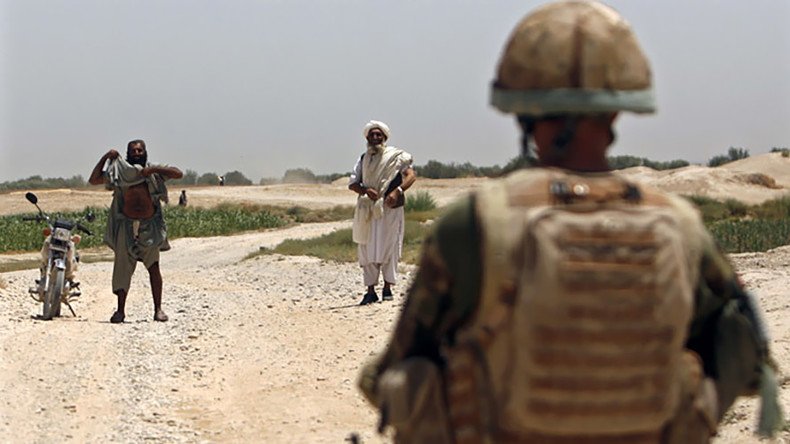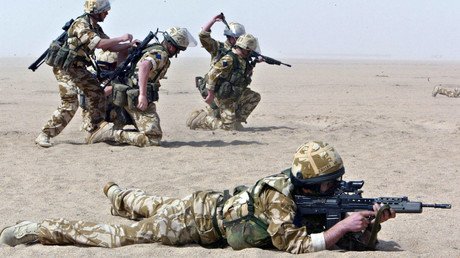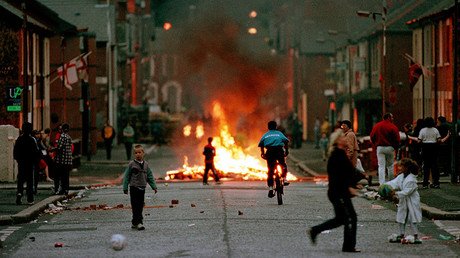‘Rogue’ SAS squadron investigated over executions of unarmed Afghan civilians – paper

“Credible” evidence indicates that Special Air Service troops executed unarmed civilians during night raids in Afghanistan and doctored after-action reports to shift blame onto their Afghan partners, the Times claims, citing military and defense sources.
The series of killings allegedly took place during the final stages of Britain’s involvement in the Afghan war, the Times reported, citing a major Royal Military Police (RMP) investigation codenamed ‘Operation Northmoor’. Part of the RMP inquiry is said to have focused on a specific SAS squadron dubbed a “rogue” unit.
Sources with detailed knowledge concerning the investigation said there is “strong evidence” that unarmed Afghan civilians suspected of being Taliban militants were executed during night raids on their homes.
Conducting Night raids to apprehend suspected insurgents was a key tactic for British and other Western forces in Afghanistan. The suspects would then be sent to detention centers in an attempt to undermine the leadership of the Taliban.
Some British army officers told the Times they believed the SAS’ night operations were often based on unreliable intelligence. Special Forces operatives were also inclined to kill rather than capture suspects, contrary to the rules of engagement.
In many cases, SAS soldiers allegedly tried to create the false impression that their victims were high-ranked Taliban warlords in order to cover up the reported killings. Members of the “rogue unit” routinely carried Russian-made Makarov pistols commonly used by top Taliban or Al-Qaeda leaders so that they could photograph them alongside the bodies of their alleged victims, according to the Times.
The ‘kill pistol’ was intended to make it look like the slain subject had posed a threat to SAS soldiers. An officer told the newspaper that a friend in another Special Forces unit had been offered such a “kill pistol,” but had refused it.
In other instances, the SAS reported that the civilians had been shot dead by Afghan commandos, who often accompanied British soldiers during the raids. However, the RMP examined the bullets found in some of the victims and concluded that they were 5.56mm rounds, which were used by the SAS at the time, but not the Afghan army, which normally used 7.62mm rounds.
Another source told the Times that, at one point, an Afghan commando unit had refused to patrol with the British because of their conduct. An Afghan Special Forces officer also told the newspaper that in 2010 he had seen SAS soldiers planting drugs and guns on a victim who had been “needlessly” shot at a checkpoint.
Sometimes the SAS would order the Afghans to stay outside the building they were raiding, possibly because they had already “decided, rather than capture, they’ll kill.” The RMP investigators reportedly acquired footage of some of the incidents – the so-called ‘kill TV’ – that shows British troops present at a shooting.
Launched in 2014, the RMP investigation has taken on dozens of cases involving alleged killings by British Special Forces. It has become one of the largest inquiries conducted by British military police, with more than 100 detectives involved.
However, the government is now reluctant to carry on with the investigation, as it could potentially lead to numerous courts martial being initiated to prosecute alleged war crimes. A Defense Ministry spokesman said on Friday that more than 90 percent of the 675 unlawful killing allegations examined by the RMP had been dropped and fewer than 10 cases are still being examined, the newspaper said.
A senior Whitehall source told the Times that the leadership of the British military consider the RMP investigation into “mass executions” to be “credible and extremely serious.” The source added that the probe is “seen as a potential disaster for the government,” so there have been attempts “to keep it under control by reducing the scale of the investigation.”
The Defense Ministry wanted “to just make it go away,” the source said. He believes officials are desperately trying to “avoid any of the detail of the accusations getting into the press and thereby undermining, in their view, national security, public trust, [and] work with allies.”














